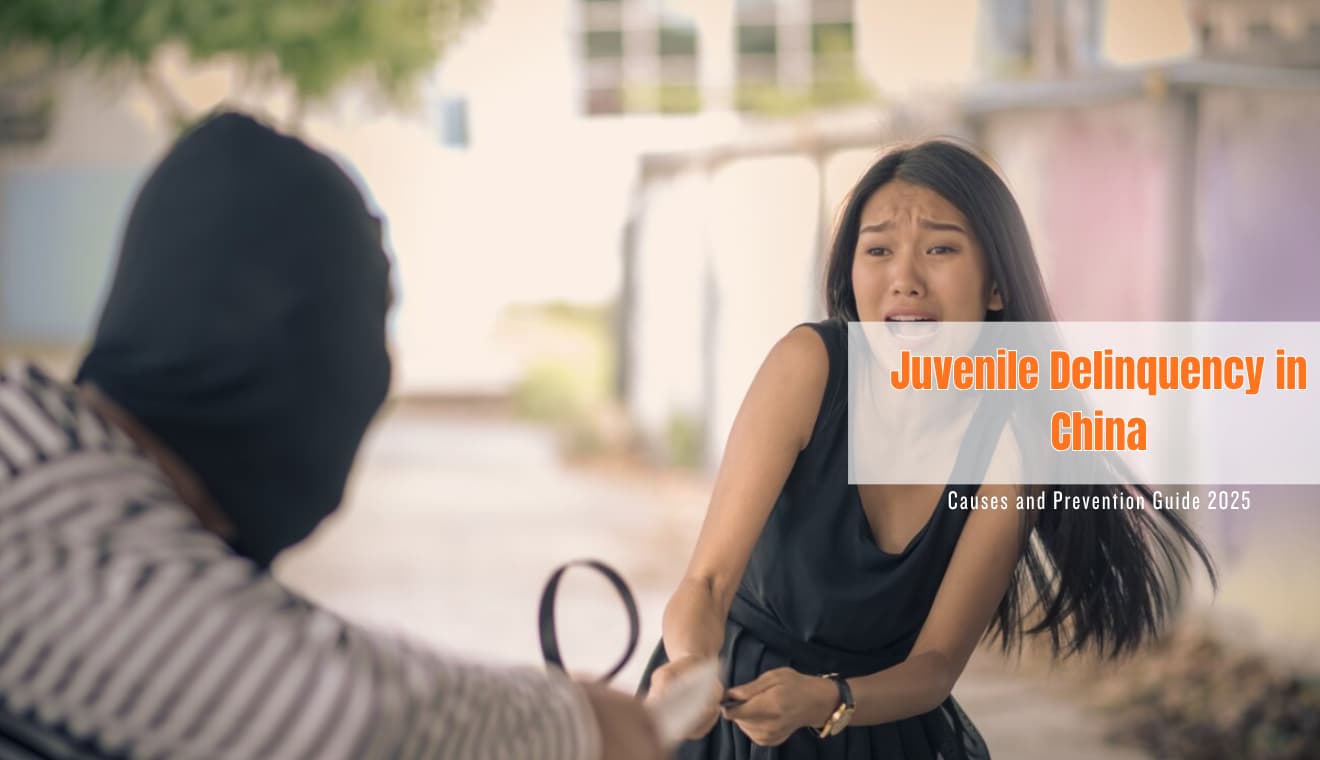Youth crime is not just a legal issue; it’s a social challenge. In China, the government has taken a proactive approach to reduce and prevent juvenile delinquency.
From anti-bullying rules in schools to online gaming restrictions, the country has launched laws and programs that address the root causes.
If you’re wondering how China prevents juvenile delinquency, this article will guide you through the laws, the reasons behind youth crime, and the prevention methods that are most effective today.
Quick Takeaways 💡:
- China’s updated Juvenile Delinquency Prevention Law took effect on June 1, 2021.
- Schools must run anti-bullying systems and report cases quickly.
- The age of criminal responsibility is usually 16, with exceptions down to age 12 for very serious crimes.
- New rules also limit online gaming time for minors, part of youth protection.
- Prevention is a multi-layered approach, with family, schools, communities, and government programs all sharing responsibility.
Understanding Juvenile Delinquency in China

Juvenile delinquency refers to individuals under 18 who break the law or engage in antisocial behavior.
In recent years, China has seen changes in juvenile crime patterns, with a rise in younger offenders and a wider variety of offenses.
- Juvenile crimes include theft, fighting, vandalism, bullying, drug use, and more serious acts.
- The average age of offenders is getting younger.
- Many delinquent acts are committed by middle and high school students.
Early Warning Signs
Parents and teachers should look out for:
- Frequent aggression or fights.
- Repeated bullying or harassment of peers.
- Skipping school often without a reason.
- Carrying weapons or vandalizing property.
- Spending excessive time online with no supervision.
China’s official reports show a slight increase in juvenile delinquency, signaling the need for better prevention and support programs.
👉 Read Related Article: What Is China’s Legal Drinking Age? Laws and Cultural Perspectives
Causes of Juvenile Delinquency in China
Understanding why young people turn to crime helps society address the root causes of the problem.
Several factors contribute to juvenile delinquency in China, often interacting in complex ways.
Family Factors
Family plays a huge role in shaping a child’s behavior. Problems at home can push children toward delinquency.
- Family instability, such as divorce or separation, causes emotional stress.
- Lack of parental supervision leads to risky behaviors.
- Abuse and neglect increase the chance of a child breaking the law.
- Low family income and education levels may limit children’s opportunities.
School and Peer Influences
School environments and friendships are powerful influences on youth behavior.
- Poor academic performance and school bullying can cause frustration and rebellion.
- Some students drop out, cutting ties with school support.
- Negative peer groups and gangs pressure youths to commit crimes.
- A lack of connection to school activities can lower a child’s sense of belonging.
Social and Economic Environment
The community and larger social context also affect juvenile behavior.
- Rapid urban growth leads to social strains and increased family breakups.
- Exposure to violence and illegal content online may encourage crime.
- Limited recreational and job opportunities leave youth vulnerable to bad influences.
- Inequality and poverty can increase juvenile crime rates.
👉 Read Related Article: What is the Age of Consent in China?
Legal Framework and Government Efforts in 2025

China’s legal system has modernized to address juvenile delinquency better, focusing on prevention and rehabilitation rather than harsh punishment.
Juvenile Delinquency Prevention Law (2025)
This law emphasizes the protection of minors, educating them about the harm caused by crime, and facilitating the reintegration of offenders into society. It promotes correctional education, probation, and community programs.
- Juveniles aged 14-18 are subject to rehabilitative penalties.
- Families, schools, and governments must cooperate for effective early intervention.
- Special protections exist for minors to prevent reoffending.
- The law treats serious crimes with appropriate legal responses while aiming to repair the harm.
Judicial and Community Systems
Several institutions work together to support juvenile crime prevention.
- Juvenile courts provide specialized handling of youth cases.
- Work-study schools offer education combined with work experience to address behavioral issues.
- Community social work programs focus on guidance and monitoring.
- Emphasis is on restoring youth dignity and reducing stigma.
👉 Read Related Article: How Old Do You Have to Be to Work in China? Age Restrictions Explained
Conclusion
China has built a stronger prevention system for juvenile delinquency over the past few years. Laws now demand responsibility from families, schools, and communities. Programs limit gaming, strengthen school safety, and support mental health.
Prevention works when everyone acts early, documents issues, and gives kids ealthier options.
👉 If you or someone you know is dealing with issues related to juvenile delinquency, expert legal advice can help. ☎️ Contact Choi & Partners for trusted, experienced consultation and support
FAQs about Juvenile Delinquency in China
What is the main law for the prevention of juvenile delinquency in China?
China’s Juvenile Delinquency Prevention Law, revised in 2020 and effective June 1, 2021, sets duties for families, schools, communities, and government to prevent youth crime and risky behavior. It works alongside the Law on the Protection of Minors, which covers broader safeguards. Together, they create a prevention-first system.
What did China change about school bullying?
Schools must build anti-bullying systems, run regular lessons, train staff and parents, and set clear punishments for different bullying types. Many places now require a bullying committee to investigate and act quickly. This is a big shift from guidance to enforceable duty.
What is the age of criminal responsibility in China?
Generally it is 16, with serious-crime exceptions for 14–15. Since 2021, prosecutors can approve cases against 12-year-olds for certain very serious crimes. Most policy still emphasizes education and rehabilitation first.
Do video-game limits for minors matter for prevention?
They are one piece of the puzzle. China restricts minors’ gaming time and enforces real-name controls, and studies find reductions in playtime and high compliance. Families should still set home rules and watch for online bullying or risky contacts.
What should a parent do if their child is bullying or being bullied?
Document incidents, contact the school’s bullying committee, and request a plan with timelines and check-ins. Save messages or screenshots, and seek counseling support. Escalate to local authorities if there is violence or repeated failure to act.
Subscribe to receive updates
Subscribe to receive the latest blog posts to your inbox every week.



